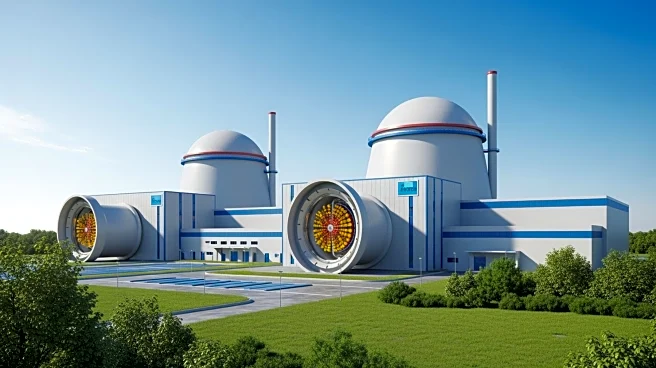What's Happening?
Westinghouse Electric, Cameco, and Brookfield Asset Management have formed a strategic partnership with the U.S. government to deploy $80 billion in new nuclear reactors. This initiative, announced on Tuesday,
aims to utilize Westinghouse AP1000 reactors, creating over 100,000 construction jobs. The partnership is part of a broader effort to enhance national security and critical infrastructure, as stated by Secretary of Commerce Howard Lutnick. The program is expected to position the United States as a leading nuclear energy powerhouse and boost exports of Westinghouse's nuclear technology globally. The agreement includes profit-sharing mechanisms that allow all parties, including the American public, to benefit from the long-term financial and strategic value generated by the growth of nuclear energy and advancements in AI capabilities in the U.S.
Why It's Important?
This partnership is significant as it underscores the U.S. government's commitment to advancing nuclear technology as a reliable and sustainable energy source. The deployment of new nuclear reactors is expected to meet the rising electricity demand, particularly from data centers, with U.S. electricity demand projected to grow at a 2.5% compound annual rate through 2035. The initiative also highlights the bipartisan support for nuclear energy as a critical component of the future energy mix, given its reliability and sustainability. Furthermore, the involvement of major players like Brookfield, which plans to double its investment in U.S. infrastructure, signals a robust commitment to building the infrastructure necessary for AI and other technological advancements.
What's Next?
The partnership is poised to accelerate the deployment of nuclear reactors, with significant implications for job creation and technological innovation. As the U.S. seeks to enhance its energy infrastructure, the focus will likely be on ensuring the successful implementation of these projects. Stakeholders, including political leaders and industry players, will be closely monitoring the progress and impact of this initiative on the U.S. energy landscape. The success of this partnership could pave the way for further investments in nuclear technology and related sectors.
Beyond the Headlines
The strategic partnership also raises questions about the ethical and environmental implications of expanding nuclear energy. While nuclear power is a low-carbon energy source, concerns about nuclear waste management and safety persist. Additionally, the integration of AI capabilities into nuclear infrastructure could lead to discussions about cybersecurity and the ethical use of technology in critical sectors. These considerations will be crucial as the U.S. navigates the complexities of modernizing its energy infrastructure.










